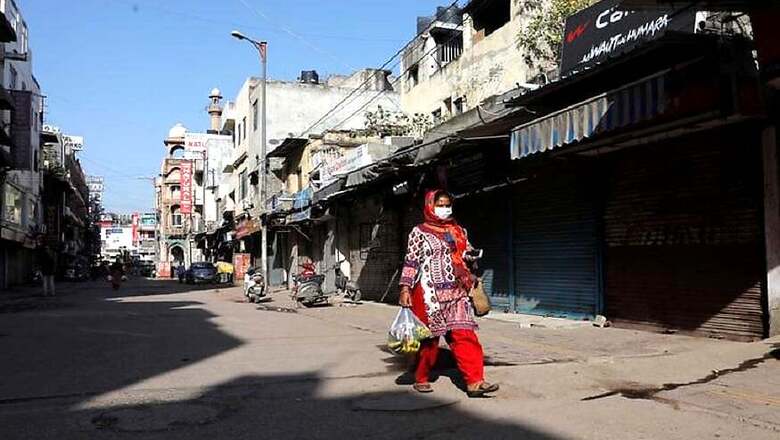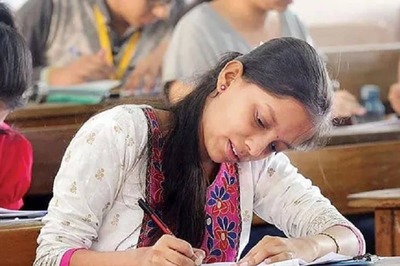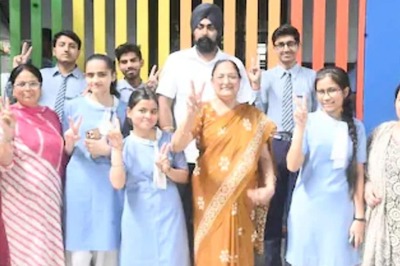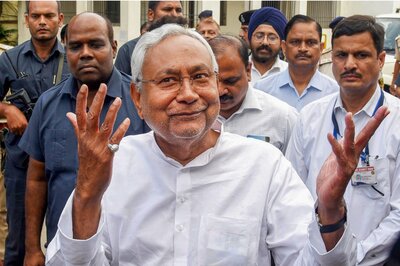
views
Four days before a total lockdown was announced in India, Bhilwara, around 250km from Rajasthan’s capital Jaipur, was put under a curfew. After a team of doctors at the biggest hospital, which is estimated to have come in contact with hundreds of people, tested Coronavirus positive on March 20, the entire city was locked down. This makes Bhilwara, being the earliest in the country to be under a lockdown, an interesting case study.
By many accounts the lockdown is working. There are very few cases of people stepping out of their houses - partly due to strict enforcement of the curfew by police, which has already arrested seven people for breaching the curfew.
The lockdown here was imposed earlier since Bhilwara accounts for nearly half of all coronavirus cases in the state after the private hospital became a hotbed of the virus. The health ministry has called it a cluster outbreak. District collector, Rajendra Bhatt, told News18 that three more people have tested positive, taking the number of cases to 17. Of the total 37 cases found in Rajasthan, 45% have been reported from Bhilwara.
Officials say the major credit for the lockdown’s success and for self-isolation protocols being followed in the town of six lakh people goes to various donors, NGOs and social outfits, who have come together to ensure that nobody here goes hungry.
"For the middle-class who can afford to buy food, we have been running 17 vehicles in each ward of Bhilwara to ensure that families get their food supplies at nominal rates. For the poorer section - street vendors, rickshaw pullers, there has been remarkable help from various NGOs, social work organisations and donors, including industrialists, textile mill owners, which have greatly added to our relief capacity," said district supply officer Sunil Verma, who has been coordinating the food supply chain in the city.
He said that a total of 2,840 families in Bhilwara were identified as being below poverty line. "Since day one, the help from civil society has ensured that we get on an average at least 5500 packets of raw food materials every day. More organisations have also come forward in the past few days. One local NGO just sent us 4,000 packets of food in the morning and another 4000 packets is on its way. All our efforts are going into ensuring that nobody goes hungry in this town," Verma said.
He added that no reports of black-marketing of food or any other good hasn't been reported from the city so far despite the city being under curfew for such a long time.
"I would say that administration worked proactively here. Before enforcing the curfew we ensured that 35,000 face masks were distributed to people. That they got enough supplies of sanitisers. Another batch of 35,000 face masks has reached us. We are waiting for the go-ahead from the top and we'll distribute these among the public too."
Journalists in Bhilwara feel that by and large the relief work in the city, and in the adjoining villages, has been a success. Although the execution of the relief work is not fool-proof, still there is very little for the common person in the city to complain about.
"I would say that the response from the civil society has been huge and heartening. Yes, there have been a few cases of people who were in a tough spot due to the lockdown - daily wagers who don't have enough to last for the entire duration of the curfew, but wherever the administration is hearing about food shortage relief work is reaching almost instantly," said Dilshad Khan, a senior journalist.
He narrated an incident about a family of six which got in touch with him after their provisions had run out. "He was a daily wager who had completely run out of money over the past five days. He got my number from somewhere, called me up and told me that he had spent the last Rs 10 in his pocket to buy rice and had nothing else to feed his wife and children. I passed on the message to the administration and within minutes they sent enough supplies to him. The administration has been really active here," Khan added.
Around the same time, when curfew was enforced in the city, the district officials started a door-to-door survey to identify families with people who may have symptoms of the disease. District administration officials said that around 70,000 families have been surveyed so far. Around 1,500 health workers, 2,400 police officers and hundreds of anganwadi workers have been pressed into service.




















Comments
0 comment